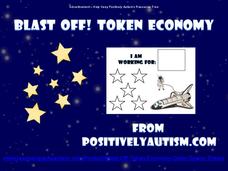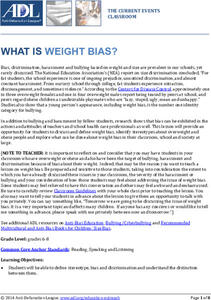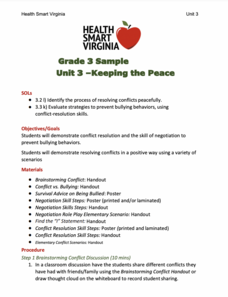University of Minnesota
Mirroring Emotions
Do you ever give your class the "teacher look"? Without saying a word, they become silent and engaged (hopefully). How do they know what you're thinking? Explore the concept of nonverbal communication and how it relates to our mirror...
Curated OER
Fix the Problem!
People won't let me finish talking!...I hate the lunch room...Leave my name alone! Explore a variety of problems learners can face on a daily basis, and use this game to have pupils determine the best ways to answer those situations.
Social Skills Central
Ready, Set, Respond!
When faced with a difficult situation, do you respond selfishly, face it head on, or ignore the problem? This game encourages learners to evaluate the wide range of reactions we can have to problematic situations, and how our responses...
Positively Autism
"When I Can Scream" Social Skill Story
Sometimes it is okay to scream and sometimes it is not. This 18-slide presentation shows kids when to use a loud, outside voice and when to use a quiet inside voice. Customized this social skills story by inserting the child's name and...
Curated OER
Flexibility Cards and Panels
Support pupils who struggle with changes, trying new ways of doing things, or seeing the perspectives of others using this set of activity cards and panels. Designed for learners on the autism spectrum, this activity will provide...
Curated OER
Silly to Serious Cards and Panels
What are the unwritten rules of formality in different social situations? Help learners identify when it is the appropriate time to be silly, funny, or serious with this collection of illustrated panels and cards.
Curated OER
Emotion Card Games
Emotions come in all shapes and sizes, and can be difficult for young learners or students with special needs to identify. Support them in gaining the valuable social skill of recognizing emotions and understanding empathy with this...
Curated OER
Self-Control Meters for Volume, Space and Levels of Formality
If your pupils have difficulty producing the appropriate voice volume in various settings or respecting personal space, refer to this "control-o-meter" device. This resource includes materials to create three meters for you to clearly...
Positively Autism
Activities for "Decreasing Supermarket Tantrums"
Priming and shaping, two teaching strategies used to prepare kids for upcoming activities, are detailed in this resource that models how to prepare kids for a trip to the supermarket. Activities include creating a shopping list, matching...
Positively Autism
Behavior Traffic Light
The behavior traffic light, a reward system designed to motivate children to control their own behavior, focuses on rewarding kids for behaving appropriately. Behaviors "in the green" earn rewards and privileges, while behaviors "in the...
Northwest Career & Technical Academy Foundation
Stand Up. . . Be InCtrl!
What is the difference between a bystander and an upstander? A collaborative project created through digital media helps the class understand that they can participate in an online community respectfully and responsibly. They consider...
Curated OER
Anti-Bullying Efforts in the Elementary Classroom
Help prevent bullying from ever beginning with these simple strategies for implementing class meetings.
Curated OER
Developing Dialogue
Why do people argue? Use the article "A Holiday Medley, Off Key" to discuss the struggles that interfaith couples face when choosing to celebrate certain holidays. Then, in small groups, encourage learners to write dialogues that...
Anti-Defamation League
What Is Weight Bias?
After setting rules and expectations to create a safe place to share thoughts and feelings, scholars define the terms; stereotype, basis, and discrimination. Using a web brainstorm, learners list words associated with overweight and...
Overcoming Obstacles
Speaking
Words! Words have meaning and power, and using them leads to consequences. The activities in this lesson are designed to remind participants to choose their words wisely when they speak.
Overcoming Obstacles
Listening
Focus, confirm, respond. Middle schoolers engage in a series of activities designed to help them improve their listening skills. They listen to and try to solve a riddle and play a version of the telephone game. Participants learn that...
Overcoming Obstacles
Respect
A social-emotional lesson focuses on respect. Scholars define the term and puzzle out the word. Pupils give examples of respect they observe at home, at school, and in the community. Cards showcase scenarios in that participants identify...
Health Smart Virginia
Keeping the Peace
A lesson examines ways young learners can keep the peace with conflict resolution. Scholars share a conflict then discuss the difference between conflicts and bullying. Pupils read scenarios and practice their negation skills.
Health Smart Virginia
Communication
In preparation for a game in which they guess the type of communication used in a scenario, scholars examine and discuss the four types of communication: passive, aggressive, assertive, and passive-aggressive. Learners identify "I"...
California Department of Education
Telling My Story
Crafting a personal statement for college admissions, job applications, or other post-high school programs does not have to be a nightmare. The "Telling My Story" packet describes the key components of successful essays and includes...
Health Smart Virginia
Making Partners
Partnering with someone new may be daunting. Here a lesson plan encourages young peers to work collaboratively in physical activity settings. Following a whole-class discussion, scholars participate in several cooperative activities that...
Health Smart Virginia
Emotional Intelligence Quotient
As an end of the Health Smart unit self-assessment, scholars design a cup with a logo and motto that reveals their emotional intelligence. To prepare, individuals complete a worksheet describing the seven Emotional Intelligence Quotients...
Story Corps
The Power of Active Listening
Listen up! The game of Telephone launches a study of active listening. Class members watch a short video that demonstrates active listening and tips on practicing active listening. Pairs then interview each other and practice their...
Teaching Tolerance
Where We Stand
Everyone is entitled to their own opinion. Academics learn strategies to share their opinions and agree or disagree with others in a respectful manner. The resource provides scenarios to help individuals form opinions and share them with...

























